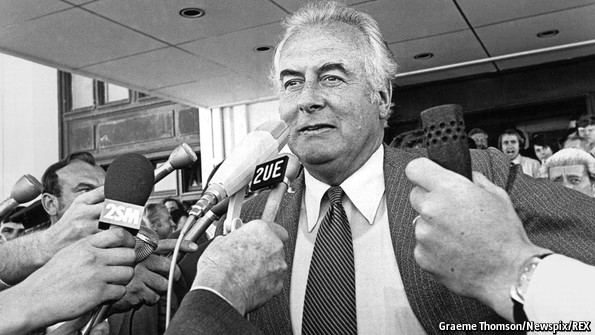( from the Economist)
Caesar in Canberra
Gough Whitlam, Australia’s most controversial prime minister, died on October 21st, aged 98

THE scene, perhaps the most dramatic in modern Australian politics, was replayed so often that it was a wonder the tape survived. Gough Whitlam, prime minister since 1972, now sensationally made ex-prime minister at a stroke by Her Majesty’s representative, Governor-General Sir John Kerr, stood facing a phalanx of microphones on the steps of Parliament House. More eager reporters, sideburned to their chins (this was 1975), jostled behind him. The governor-general’s official secretary, his hands shaking, had ended his declaration: “God save the queen.” “Well may we say ‘God save the queen’,” hurled back Mr Whitlam, over rising shouts of “We want Gough!”; “because nothing will save the governor-general.”
Australia had barely had time to catch its breath during his time in office. He came in like a hurricane, a Labor man after 23 years of Liberal-and-Country Party debris, and swept it all away. In his first ten days alone, governing as a duumvirate with his deputy, he crossed off well over half of his to-do list: got Australia’s last troops out of Vietnam, ended conscription, and set up commissions to look into school funding, equal pay and aboriginal land rights. You didn’t need a Parliament to do any of that. By the time of the Coup, as he called it, he had brought in a state-funded health system, then called Medibank; no-fault divorce laws; electoral reform, tariff reform, votes at 18 and free university education. He had also given Papua New Guinea independence and opened up relations with China. No wonder the general view, in his opinion, was that he was the best prime minister Australia had ever had.
His triumphant progress, however, was hobbled by several things. Most annoying was the factionalism of the Labor Party and its reluctance to get behind him. Many members did not trust his middle-class sheen, acquired in the swankier suburbs of Melbourne and Sydney from a lawyer father and from schools where he lapped up ancient Greek. This was a man who never quite managed the demotic, though he might slap constituents on the back; a man who pored over “Who’s Who”, whose speeches sagged with dry facts (“More bullshit!” his media liaison would plead), and whose late-in life books were all boastfulness, rather than colour or charm.He certainly played the part, sleek, imposing and commanding. His temper was legendary, sending timid staffers diving under their desks; his appetite was formidable, with steak for lunch and an eager eye for sponge cakes at any point. Whitlamite put-downs and quips were rude and long remembered. Malcolm Fraser, who replaced him after the Coup, was “Kerr’s cur”. A networking political rival was “Tiberius of the telephone”. A voter who heckled him on abortion was told that, in his case, “we should make it retrospective”. Struggling with a microphone that kept dropping down, he remarked: “The harder you try, the floppier it gets.”
Alongside Mao
Some suspected him of being a “silvertail”, not a true socialist, and to some degree they were right; he was neither a nationaliser nor a union man. His agenda, put simply, was to advance Australia. This meant action on every front, from a new national anthem (“Advance Australia Fair”) to standing up against America’s wars; from huge sums of money for the arts, which brought self-exiled novelists and film-makers flocking home, to world-class hospitals and schools. Mr Whitlam first campaigned for Parliament in Werriwa in western Sydney, then a suburb without proper roads or sewers and teeming with new migrants. In office he pumped money into the cities and, in every way, encouraged Australians to be proudly multicultural rather than cringing, colonial and mostly white.
He was blocked all the way, however, by the conservative opposition in Parliament, which forced an election halfway through his term and, with the help of state premiers, thwarted his attempts to get a majority in the Senate. His opponents pointed out that all his policies and giveaways couldn’t be paid for, especially at a time of oil-price shocks and runaway wage inflation; no, not even by trying to borrow $4 billion, very dodgily, from a Pakistani broker peddling petrodollars. In 1975 they refused to pass his budget. He accused them of playing funny buggers, and worse; but the fact was, for all his meticulous logging in 70 notebooks of every move he made, he did not seem to have registered that two and two did not add up to five.
And so came the great fall, on a sunny spring day: Remembrance day, as it happened. To those still puzzled by the many contradictions in Mr Whitlam, there was a clue in the way he reacted. After every crisply articulated sentence he would give a defiant toss of his head, displaying that perfect aquiline profile, as on one of Caesar’s coins. It all made sense then: the streamers, balloons and pumping music of his rallies; the ruthlessness and single-handedness; the lack of confidants, save staffers who called him “Leader”; the crowd-pleasing policies, and the crowd abjuring ways. What Mr Whitlam really wanted was to stand among the giants of his time, alongside Mao and Nixon (why on earth not?), and prove Australia’s ruler equal to them. What the microphones did not pick up on the steps of Parliament House was the swish of a purple robe.
No comments:
Post a Comment